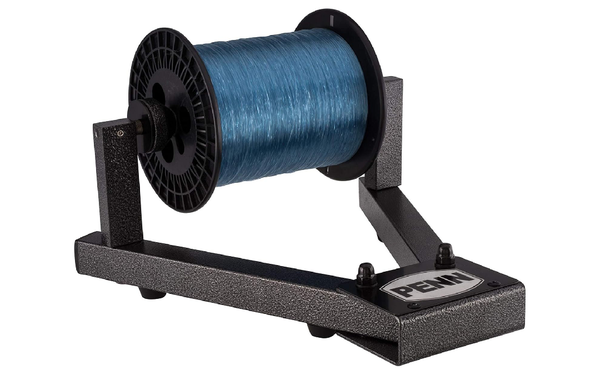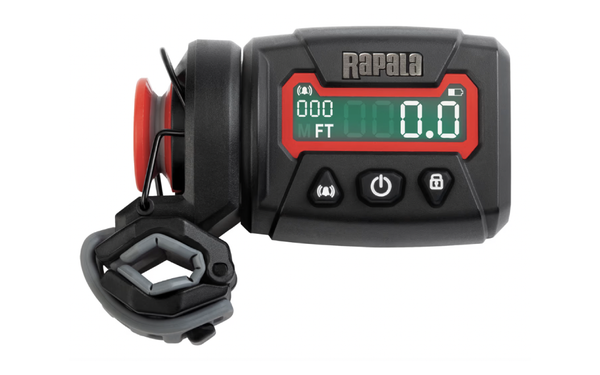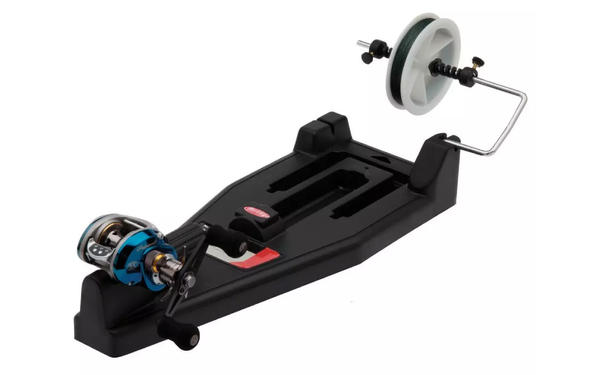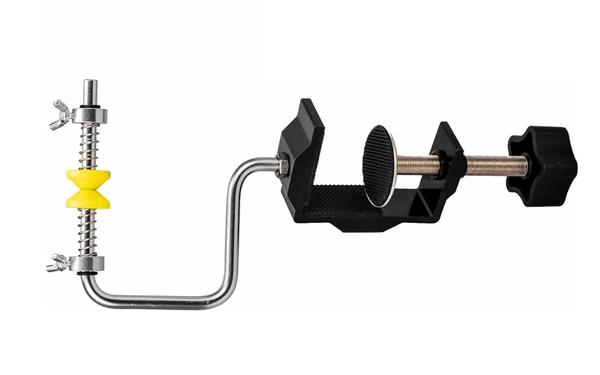We may earn revenue from the products available on this page and participate in affiliate programs. Learn more ›
Believe it or not, a fishing line spooler can be the first step in landing the fish of a lifetime. After all, when targeting big fish, nothing is more important than good fishing line. If the line holds tight, you will catch a trophy. If the line breaks, say goodbye to success.
Sun, salt, and slime cause the material in fishing line to break down. And fishing causes abrasion and stretching along the line. To avoid losing your favorite lure or your next personal best, it is important to replace the line on your fishing reels regularly.
Always inspect your line for abrasion, stretching, and discoloration—test monofilament by yanking on it to see if the line breaks. Braided line is prone to fraying. Look for the braided strands to separate and the color to fade. As fluorocarbon breaks down, it will turn milky-colored and stiff.
If you see any of these signs, it is time to change your fishing line. To change the line on a couple of small reels, you can just use a pencil to hold the spool and ask a friend to help. But bigger jobs and bigger reels require the best fishing line spooler—which we’ve ranked below.
The Best Fishing Line Spoolers
Best Overall
Specs
- Weight: 8.32 ounces
- Dimensions: 10.32 X 6.29 inch
- Materials: Graphite
Pros
- Spinning or casting reels
- Fills and removes line
- Folds to fit in a pocket
- Braid or monofilament
Cons
- Does not accommodate large filler spools
The best fishing line spooler for spinning reels is the Piscifun Speed X Fishing Line Spooler. It rotates to eliminate twists and ensure even line lay with spinning, baitcasting, spincast, and casting reels. Just as notably, it works equally as well with monofilament as it does with braided line.
Removing old line from a fishing reel is almost as tiring as filling it with new line, and piles of used fishing line creates a big mess. We like that this Piscifun spooler makes the chore quick and clean. First, attach the reel to the base and tie the line to an empty filler spool. Then, turn the un-winding handle to rapidly remove the line. Once the reel is empty, place a new filler spool into the clamp, tie the line to the reel, and fill it back up.
Best Winder

Specs
- Weight: 6.75 pounds
- Dimensions: 14 x 4 x 4.5 inches
- Materials: Steel
Pros
- Heavy-duty construction
- Adjustable spool tension
- Accepts both filler and bulk spools
Cons
Sturdy construction and simple operation make the Penn Fishing HD Line Winder our favorite winder and one of the most popular choices for pro anglers. It will solidly hold spool sizes from filler to bulk while applying adjustable tension to tightly pack the line on the reel. It also folds down flat for easy storage when you’re finished.
Not only does the steel frame resist corrosion and damage, but the heavy metal station provides a solid base for holding a spool of line. Finally, the Penn line winder will hold a small filler spool or a huge bulk spool to fill one reel or 100. Adjusting the filler-spool tension allows you to wind the line tightly to avoid tangles and backlashes.
Best With Counter

Specs
- Weight: 4.25 ounces
- Dimensions: 1 x 1 x 1 inch
- Materials: Plastic
Pros
- Bright, backlit digital display
- Line count alarm
- Easy to mount/remove
- Metric or standard measures
Cons
Accurately filling a reel with line requires a line counter to measure the amount of fishing line added to the reel. For example, some reels require a backing of one type of line and a top shot of another type of line. Filling each reel with a precise amount of backing will ensure enough line when a big fish takes off for the horizon. That’s when you need (or at least want) a fishing line spooler with counter.
Rapala’s Digital Line Counter is accurate and easy to use. Just attach it to the fishing rod, thread the line through the wheel and start cranking the reel handle to measure the line in feet or meters. The line counter’s backlit digital display is easy to read in addition to displaying line count in metric and standard units. I’ve been using it for awhile. My favorite feature is the alarm that alerts me when the reel is full.
Best Station

Specs
- Weight: 1.37 pounds
- Dimensions: 19 x 8 x 3 inches
- Materials: Plastic
Pros
- Tabletop winder
- Fills spinning or baitcasting reels
- Compact design
Cons
If you don’t have space for a full-powered line spooler, Berkley’s Portable Line Spooling Station is a fantastic portable option—and the next best thing. It can quickly and easily replace the line on a pile of fishing reels, anywhere. Attach a spinning or baitcasting reel to the base and load a spool of line onto the thimble. The bobbin will hold small to medium-sized spools of line and apply pressure to the spool while winding.
The tabletop station provides a solid base to apply pressure to the line. Bonus: The lightweight, low-profile design allows the line spooler to fit in a tackle box or bag so you can take a full-feature line spooler wherever you fish.
Best Budget

Specs
- Weight: 7.76 ounces
- Dimensions: 8 x 6 x 2 inches
- Materials: ABS Plastic
Pros
- Adjustable tension
- Inexpensive
- Portable
- Strong, padded clamp versatile enough to work on table, chair, or workbench
Cons
At just $15, the THKFISH line spooler is the best budget pick and the perfect solution to fill a few reels quickly, at home or on the go. It offers the versatility of a full-size line spooler in a portable package—it fits easily in a tackle bag but can handle bulk spools with ease.
Clamp the line spooler to a table, chair back, or workbench and insert the filler spool in the clamp. Tighten the tension knobs to hold the spool in place, adjusting it to provide enough tension to pack the line on the reel tightly. Run the end of the line through the guides, and tie it to the reel spool. Then, use the tension from the line spooler and the guides to fill the reel with line.
We like that this one is simple and easy to use, and the small size means it’s ready any time.
How We Evaluated Fishing Line Spoolers
To choose the best fishing line spoolers, we compared each product to other tools in their category. Whether we were assessing full-featured line spoolers or portable units, we looked for the strongest, smoothest, and easiest to use model at the lowest price. I considered the following when making my selections.
- Twist: The most important quality of a spooler is that it fills a reel without twisting or tangling. The best fishing line spoolers allow the line to flow in the correct direction for whatever reel you’re filling—baitcasting, spinning, or otherwise.
- Pressure: Pressure must be kept on the line to fill a spool properly. I looked at how well each applies pressure to the filler spool, so the reel is packed tightly with line.
- Durability: Transferring hundreds of feet of line to a reel with enough pressure to ensure the line lies correctly creates tremendous stress. I only considered spoolers with sturdy construction and a solid connection to the base.
Fishing Line Spooler Buying Guide
Before buying a fishing line spooler, the most important thing to consider is how many reels you need to fill. A portable line spooler is easy to use without taking up space to change the line on one or two reels. For bigger jobs, like changing line on a dozen reels or filling large reels with line, ask for a full-size line spooler capable of handling a bulk filler spool.
Most people only use the spooler a few times per year. So, the line spooler should be easy to store between jobs, whether it’s full-sized or portable. Stashing the spooler out of the way reduces clutter and protects the spooler from damage.
Finally, the cost can be an important factor. A full-size line spooler carries a full-size price tag, which may be too expensive for casual anglers. For occasional use, you can get great performance out of a less expensive model.
FAQs
Q: How to spool fishing line?
The first step is to securely attach the line to the reel arbor. Then, make sure the line goes on the reel in the correct direction. Finally, use enough tension to pack the spool tightly.
Use an arbor knot to attach the line to the reel arbor, so the line doesn’t spin on the spool. For braided line, add a piece of electrical tape to the arbor to keep the line from slipping.
To check if the line is winding in the correct direction, add slack to the line to see if it twists and loops after making a few dozen turns of the reel handle. If the line twists, spin the filler spool so the line leaves in the opposite direction.
Apply enough tension to the line so it fills the spool evenly. The tighter the line is on the spool, the less chance of twists and tangles.
Q: Why does my line keep unraveling?
If the line twists while filling the spool, the line will loop and tangle while you are fishing. On a spinning rod, this will cause wind knots. Loose line on a baitcasting reel will produce a backlash tangle.
Q: How do I use a line spooler?
To use a line spooler, ensure it is securely attached to the base to produce enough tension to pack the reel with line. Then, insert the filler spool in the line spooler and attach the line to the reel. Tighten the tension knobs on the line spooler to tightly wind the line onto the spool.
Q: How often should you replace fishing line?
Monofilament fishing lines should be replaced each season, more often if you fish hard. If it is stored inside, braided fishing line can last for a couple years. Fluorocarbon line is susceptible to sun damage and should be replaced a couple times each season. After each fishing trip, it’s a good idea to cut back a couple feet of line and retie knots.
Why Trust Us
For more than 125 years, Field & Stream has been providing readers with honest and authentic coverage of outdoor gear. Our writers and editors eat, sleep, and breathe the outdoors, and that passion comes through in our product reviews. You can count on F&S to keep you up to date on the best new gear. And when we write about a product—whether it’s a bass lure or a backpack—we cover the good and the bad, so you know exactly what to expect before you decide to make a purchase.
Read the full article here




